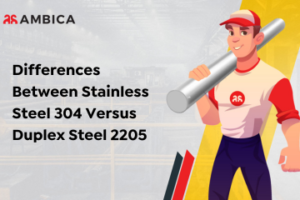Since the beginning of the industrial revolution, humankind has been thriving daily to produce precise and superior quality products. The aforementioned situation is with steel manufacturing industries which, resulted in the invention of precision bars. The invention of precision bars has revolutionized several Auto, pump and shaft, power, and heavy engineering machinery industries by acting as a superior alternative to the ground and polished bars.
Precision Round Bars, as the name suggests, are bars manufactured with a high degree of accuracy and precision. Close dimensional and straightness tolerances, strength, smooth surface finish (lower surface roughness), roundness are some primary characteristic features that make precision round bars fit for its purpose in industries. The method employed in manufacturing these bars helps in achieving characteristic properties and thereby making precision round bars more reliable, efficient, operative, and high performing.
Stainless steel precision bars offer higher strength, toughness, hardness, corrosion resistance, thereby making them more popular among all industries. Adding to advantages, stainless steel bars can easily withstand extremely harsh climatic conditions. Stainless steel precision bars can be customized as per application, thereby offering an enormous variety of grades, sizes, lengths, shapes, and surface finish in its products.
While manufacturing or transporting precision bars, the following attributes must be taken into consideration. These attributes differ precision bars from others:
- VIBRATIONS: – Since precision round bars are used in heavy machinery, hence it is essential that a high degree of straightness is maintained in them, which in turn results in the generation of minimal vibrations while in application. Excessive vibration of bars can result in reduced machine efficiency by the generation of excess heat or by damaging parts of the machine. Therefore, to obtain such narrow straightness tolerance (about 0.25 mm/mtr.), these bars are passed through straightening machines till desired straightness is achieved.
- STRENGTH: – As precision round bars find their application in machines subjected to heavy load, pressure, and stress under extreme climatic conditions, therefore it is highly essential that the manufactured bar has strength (Tensile and Yield strength) suitable for its application. The strength of these bars depends on the chemical composition and heat treatment technique (Annealed, Solution Annealed, Quench and Tempered, Hardened and Tempered, Quenched, and Double Tempered) subjected during manufacturing. The strength varies from grade to grade.
- DIAMETER: – The principal characteristic of precision round bars be close dimensional tolerances, which are achieved by carefully machining (grinding) the bars several times till desired tolerance is achieved. Close dimensional tolerance is highly essential to avoid damage to machinery or bar itself, which is in working condition. To obtain maximum machine output, it is also essential that the bar used should be free from ovality and lobbing.
- ROUGHNESS: – To minimize frictional losses between the bar and machine, precision bars are supplied with lower degree of surface roughness. The surface roughness of precision bars are reduced by passing it through the polishing unit several times till the desired surface finish (Ra-0.2 um/12 RMS min) is obtained.
- SHIPPING: – To preserve surface condition, close dimensional, and straightness tolerances, it is essential that precision bars must be shipped carefully to the customer. For this purpose a considerable amount of care is taken during packaging and dispatch. Precision bars are shipped by packing them in variety of protective materials, rings and then placed in plywood boxes to ensure safety during transportation.
APPLICATIONS:
Precision round bars due to its characteristics attributes have an extensive amount of applications. Some of them are:
- Pump Shaft Manufacturing
- Boat Shaft Manufacturing
- In Oil and Gas Industries
- In Petrochemical Industries
- In Automobile Industries for Piston Rod, Cylinder Shaft, and other components.
- Valve Shaft
- Hydraulic/Pneumatic Piston Shaft
- Chrome Plating Quality Bars
- Bearing Sized Bars
- In Precision Machined parts
About the Author
 Vaibhav Kandiyal is a Quality Engineer with Ambica Steels Limited. His leisure time activities include reading and writing blogs on Material, Manufacturing and Thermal Sciences. To keep it simple for the understanding of readers is the main goal of his blogs.
Vaibhav Kandiyal is a Quality Engineer with Ambica Steels Limited. His leisure time activities include reading and writing blogs on Material, Manufacturing and Thermal Sciences. To keep it simple for the understanding of readers is the main goal of his blogs.


